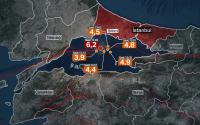Common Dreams / Published on Thursday, October 13, 2005 by the Boston Globe
Panic has set in. With the price of oil hovering at more than $60 a barrel on world markets and forecasters predicting that we will soon see oil selling for $100 a barrel or more as worldwide oil reserves dwindle, politicians and business leaders are running scared. The global economy is beginning to slow, and there is talk about a new and sustained long-term global recession -- some economists are even talking about a global depression -- that could last for decades.
We are quickly waking up to the fact that the whole world runs by oil. We are an oil civilization. We grow our food with the help of petrochemical fertilizers and pesticides. Our plastics, pharmaceutical products, and clothes are for the most part derived from oil. Our transport, power, heat, electricity, and light are all dependent on oil.
President Bush has called upon Americans to drive their automobiles less -- more than half of the cars in the country are gas-guzzling SUVs -- to save precious fuel. The White House has also asked federal employees to cut down on all but essential travel, to carpool, and to use public transportation. In addition, the president ordered White House thermostats to be turned to 72 degrees Fahrenheit to save energy.
Incredibly, at the same time Bush was proclaiming his newfound conversion to energy efficiency, the White House and Senate Republicans were working quietly behind the scenes to scuttle the remaining six Department of Energy regional energy efficiency field offices responsible for helping low-income families, the business community, and local, state, and federal government to implement energy efficiency measures.
It appears that the president and his team do not understand the enormity of the energy crisis facing the United States and the world. The White House clearly needs guidance. The president should download the just published European Union Green Paper on Energy Efficiency (europa.eu.int/comm/energy/efficiency/index_en.htm). The paper lays out a detailed survivor's guide, a roadmap of what every individual, family, community, and country -- including the United States -- can do to cushion the cost shock of rising oil prices.
According to the report, the European member states alone could save at least 20 percent of their present energy consumption for a net savings of 60 billion euros per year, by enacting tough energy conservation programs across European society -- in homes, commercial buildings, factories, and transport. The EU report says the United States could save far more with widespread adoption of energy conservation practices since the United States currently wastes approximately 50 percent more energy than the European Union to produce one unit of GDP.
The EU commission study says the average EU and American household could save as much as $1,200 per year in cost-saving energy efficient practices, thus offsetting much of the increased price of oil. The EU green paper is replete with detailed information on how to overhaul every aspect of our lives to achieve more energy-efficiency.
Proposals include incentives to purchase energy-efficient cars, reducing the national speed limit to 55 miles per hour, making alterations in homes and commercial buildings, like installing special insulation and storm windows, using long-lasting electric light bulbs, introducing software into appliances to save energy, renovating the nation's power grids to be more efficient, and other practices.
The White House, Congress, and the states will need to employ a range of strategies including taxation, public subsidies, economic incentives, and partnerships with industries, communities, and homeowners to make the transition to a truly energy-efficient society.
While government, industry, and consumers will have to spend some money up front to usher in literally thousands of energy efficient ''best practices," the investment will boost the economy by creating millions of new jobs. Moreover, the cost savings of improved energy-efficiency will mean more money will be freed up to invest in other forms of sustainable economic development.
The United States should lead the way by declaring a state of ''national urgency" and setting a goal of five years for fully executing the suggestions contained in the EU Commission's Green Paper on Energy Efficiency. After all, the United States consumes more than 25 percent of the fossil fuel energy used in the world, even though it has less than 5 percent of the global population. The United States is the world's leading energy-guzzler. Now, it should set an example and become the world's leading energy-saver.
Jeremy Rifkin is author of ''The Hydrogen Economy: The Creation of the World Wide Energy Web and the Redistribution of Power on Earth" and principal adviser to the European Union parliamentary leadership group for renewable energy and a hydrogen economy.






